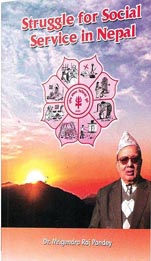 | Struggle for social service in Nepal Published by: Mrigendra-Samjhana Medical Trust, Kathmandu, Nepal |
In Nepal, a developing country in South Asia, the poverty level is high, standard of living low, and healthcare delivery is difficult. Nepalese Dr Mrigendra Raj Pandey is a respected senior cardiologist who trained in India and the UK but returned to serve the people of Nepal. His recently published book Struggle for Social Service in Nepal gives a detailed account of the Mrigendra-Samjhana Medical Trust which he founded to provide health services to poor and underserved people in Nepal.
Dr Pandey donated a commercial building in the center of the Nepalese capital Kathmandu to the Trust. At the time he was working in Bir Hospital, the oldest hospital in the country. In the early 1970s he and colleagues founded health camps in the rural outskirts of the Kathmandu valley. Later, Dr Pandey noted that most hospitalized patients in winter in Jumla District were suffering from bronchitis, which often relapsed after discharge. He linked the high regional prevalence of bronchitis in winter with indoor air pollution mainly due to smoke from the fuel used for cooking and heating. As a result the Trust distributed smokeless cooking-stoves and conducted other related interventions which saw a dramatic reduction in the under-5 year-olds' mortality rate from 330 to 85 deaths per 1000 live births within a few years.
Dr Pandey was also involved in tobacco smoking cessation programs, and the prevention of non-communicable diseases such as heart disease and diabetes mellitus. The Trust involved traditional healers in rural healthcare delivery, and trained them to provide oral rehydration salts to children suffering from diarrhea. The Trust was also active in constructing toilets and providing clean drinking water in rural areas.
However, the book Struggle for Social Service in Nepal is not just a series of success stories. It also tells of conflict between the Trust and the United States Agency for International Development (USAID) and other foreign agencies, whose 'willing' support often came with strings attached, such as the Trust discontinuing existing relationships with other agencies. For example, the Trust was offered international funding for large-scale research - but on the condition of disregarding the results of a small study already conducted with support from a domestic agency. Although the Trust faced financial difficulties and its building had to be sold after foreign aid was suspended, a way was found to continue. During the struggle Dr Pandey's beloved daughter, Samjhana, died while studying in India. Her name was incorporated into the Trust's title.
Dr Pandey provides a detail account of his outstanding efforts and struggles as the founder of one of the greatest philanthropic organizations in Nepalese history. Archival photographs add to the beauty of the book. The book has been written in a simple and lucid style in the English language. It will be of interest to all concerned with rural and remote health, as well as those with a special interest in Nepal.
Cost and availability
The proceeds will go to the Trust. In 2011 the price is:
- for those in Nepal, Nepalese Rs 200.
- for Indian readers: Indian Rs 200 (soft cover) & Rs 400 (hard cover).
- for international readers US$10.00 (soft cover) & $20.00 (hard cover). A discount may be available to readers from SAARC countries.
Copies can be ordered from:
The Mrigendra-Samjhana Medical Trust, PO Box 2587, Maitighar, Kathmandu, Nepal.
Email: pandeymr@gmail.com
